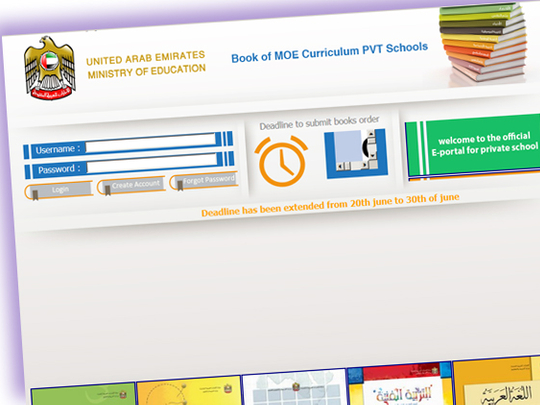
Dubai: The majority of private schools in the UAE can now order their Ministry of Education books online for the academic year 2014-2015.
The Ministry of Education officially inaugurated the e-portal on Sunday, which will allow 450 private schools in the UAE to submit and follow up on their book orders.
The e-portal, which can be accessed from the Ministry of Education’s website or through uaeschoolbooks.com, was created by the ministry in partnership with Dubai Media Incorporated, to facilitate the process of ordering books for schools.
“The schools will be able to place the order, check the status of the order, review it, add to it, and then print an invoice,” said Marwan Al Sawaleh, Undersecretary of the Ministry of Education.
Al Sawaleh said the new method will ensure that all the books arrive on time for the start of the academic year. It will also ensure that the needed number of books for each school will be available on time.
During the soft launch of the website, 250 schools had already placed their order from the 134 books available on the website.
Hamid Maammer, Regional Business Development Manager at Masar Printing and Publishing, which is doing the printing and publishing of the books, said all the schools were briefed on the new ordering methods and were provided with a username and password that would allow them to access the website and place their orders.
Maammer said the payment, which has to be made by the schools prior to receiving the books, can be made through bank transfer, cash or manager cheque.
“After making the payment they can scan their receipt and send it to the portal for proof of payment. Also, the whole process, from the prices to payment, is documented in the system. Once the order is ready the school can pick it up from Masar Printing and Publishing,” he said.
Documenting the whole process will help prove what exactly did not come through in the book ordering process because there have been many cases where the ministry was blamed instead of schools who did not order books on time, said Maammer.
The deadline for ordering the books has been extended from June 20 to June 30. Each group of schools will also have a supervisor who will be in charge of following up the process.
“The portal took three to six months to be ready and we expect to print around three million books,” he added.
If the school fails to use the portal to place the order before the deadline, they can send their orders through email or telefax.
Al Sawaleh said the ministry plans on including public schools in the near future.












